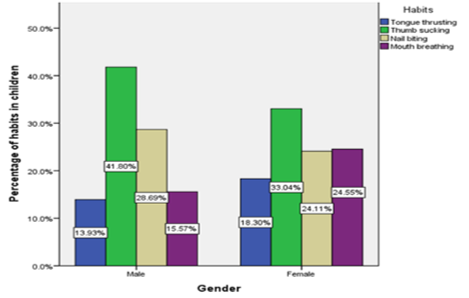Abstract
Oral health influences the overall health of an individual. Hence, when oral health is affected the general well-being of the individual is unbalanced. Habits are repetitive actions done automatically. They represent an altered pattern of muscle contraction, done unconsciously and on a regular basis. Some habits are helpful, whereas other habits are deleterious over the long run. Habits can be either functional or non-functional. Functional habits include repeating normal functions unnecessarily like swallowing, chewing and nasal breathing. Whereas non-functional habits are unnecessary extra functions like thumb-sucking, nail-biting and lip sucking. The aim of this study was to evaluate the correlation between age, gender and habits. A retrospective study was conducted in the Saveetha Dental College, Chennai, India. Ethical clearance was obtained from the SRB committee, Saveetha Dental College, Chennai, India. The clinical portion of this retrospective study was conducted over nine months, i.e., between June 2019 to March 2020. Data were collected from a total of 86000 patients who visited the Saveetha dental college between Jun 2019 to March 2020. Chi square test was done to evaluate the association between age, gender and habits. In the present study, there was 35.3% were males, and 64.7% were females. 15.6% were four years of age, 9% were five years of age, 11.3% were six years of age, 10.7% were seven years of age, 17.6% were eight years of age, 12.7% were nine years of age, 0.6% were ten years of age, 10.7% were 11 years of age. 16.8% have tongue thrusting, 36.1% have thumb sucking, 25.7% have nail-biting, 21.4% have mouth breathing. Within the limitations of this study, there was no significant association between habits and age [P=0.086] and gender [P=0.102].
Full text article
Authors

This work is licensed under a Creative Commons Attribution-NonCommercial-NoDerivatives 4.0 International License.

